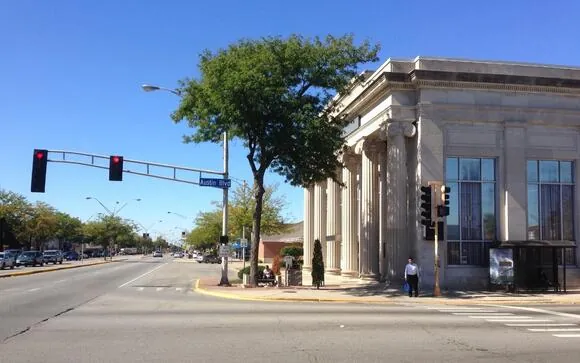Illinois, the Land of Lincoln and the “Prairie State,” evokes images of fertile farmland, bustling cities, and a rich history. Yet, beneath the surface of this seemingly prosperous landscape lies a darker reality: a significant struggle with depression in many of its communities. While pinpointing a single “most depressed” city is a complex and subjective task, several Illinois cities have garnered attention for their struggles with mental health and well-being. This article delves into the factors contributing to these struggles, examines the impact on residents, and explores potential avenues for hope and healing.
Defining the Depths: Metrics and Misconceptions
- Understanding Depression: Before diving into specific cities, it’s crucial to understand depression itself. This multifaceted condition can manifest in various ways, affecting mood, energy, sleep, appetite, and overall functioning. Recognizing its diverse presentations is essential for accurate assessments and effective interventions.
- Challenges of Measurement: Capturing the prevalence of depression in a city presents unique challenges. Official diagnoses may not fully reflect the true picture, as factors like stigma and lack of access to healthcare can lead to underreporting. Additionally, various studies and reports utilize different methodologies and criteria, making comparisons across cities difficult.
- Beyond the Ranking Game: Focusing solely on the “most depressed” label can be misleading and detrimental. It overlooks the nuances of individual experiences, reinforces negative stereotypes, and distracts from the broader need for comprehensive mental health support across all communities.
Spotlight on Struggles: Examining Specific Illinois Cities
- Cicero: A Tale of Economic Disparity: This Chicago suburb faces high poverty rates, low income levels, and unemployment exceeding the national average. These economic hardships can create significant stress and despair, contributing to increased risk of depression and other mental health issues.
- Rockford: From Industrial Might to Decline: Once a thriving manufacturing hub, Rockford has grappled with economic downturn and population loss. This decline has led to job insecurity, limited opportunities, and a sense of hopelessness, factors that can exacerbate depression and contribute to a negative perception of the city.
- Carbondale-Marion: Beyond the College Town Facade: While home to Southern Illinois University, this metro area struggles with issues like poverty, limited job opportunities, and crime. These challenges can negatively impact residents’ sense of purpose, financial security, and overall well-being, contributing to feelings of depression and dissatisfaction.
Beyond the Statistics: Recognizing Resilience and Hope
- Individual Stories of Strength: While the aforementioned cities face significant challenges, it’s crucial to remember that they are not defined solely by their struggles. Many residents demonstrate incredible resilience and resourcefulness in coping with their circumstances and building meaningful lives. Highlighting these stories of individual strength and community support is vital for combating stigma and fostering hope.
- Community-Based Initiatives: Numerous local organizations and initiatives are working to address mental health needs in Illinois communities. These programs offer counseling services, support groups, educational resources, and advocacy efforts, playing a crucial role in promoting mental well-being and reducing depression.
- Policy and Systemic Change: Addressing the root causes of depression requires systemic interventions beyond individual-level support. Investing in economic development, affordable housing, education, and social safety nets can create a more supportive environment for mental health and overall well-being.
Additonal Source –
- 24/7 Tempo: https://www.businessinsider.com/cheapest-most-affordable-cities-in-us-places-to-live-2023-5
- Mental Health America: https://mhanational.org/
- Illinois Department of Public Health: https://dph.illinois.gov/
FAQ’s:
Q: Beyond the three cities mentioned, which other Illinois communities struggle with depression?
A: While Cicero, Rockford, and Carbondale-Marion often receive attention, numerous Illinois cities face significant mental health challenges. Communities with concentrated poverty, economic decline, limited access to healthcare, and high crime rates are particularly vulnerable. Some examples include East St. Louis, Peoria, Decatur, and Joliet.
Q: Are economic factors the sole contributors to depression in these cities?
A: While economic hardship can be a significant stressor, other factors play a role. Social isolation, lack of community support, limited access to green spaces, and exposure to violence can also contribute to depression. Additionally, individual vulnerabilities like genetic predisposition, personal experiences of trauma, and pre-existing mental health conditions can influence susceptibility.
Q: What are the specific consequences of depression on these communities?
A: Depression can negatively impact individuals, families, and entire communities. It can lead to decreased productivity, increased healthcare costs, relationship problems, substance abuse, and even suicide. Additionally, it can perpetuate cycles of poverty and hinder economic development.
Q: What resources are available for individuals struggling with depression in these cities?
A: Fortunately, various resources can provide support. Local mental health clinics, community centers, faith-based organizations, and national hotlines like the National Suicide Prevention Lifeline (1-800-273-8255) offer counseling, support groups, and crisis intervention services. Additionally, online resources like NAMI (National Alliance on Mental Illness) and MentalHealth.gov can provide information and support services.
Conclusion:
The quest to identify the “most depressed” city in Illinois ultimately misses the mark. Instead, we must acknowledge the broader challenges faced by many communities in the state and focus on fostering a culture of understanding, support, and proactive intervention. By recognizing the complexities of depression, celebrating individual resilience, and investing in community-based solutions and systemic change, Illinois can create a brighter future for all its residents, one free from the shadow of depression.
Disclaimer: Identifying the “most depressed” city in Illinois is a complex and subjective endeavor. Different studies and metrics can lead to varying results, and focusing solely on such rankings can be misleading and detrimental. It overlooks the nuances of individual experiences, reinforces negative stereotypes, and distracts from the broader need for comprehensive mental health support across all communities.
Instead of seeking a singular “most depressed” city, it’s more helpful to acknowledge the challenges faced by many Illinois communities and consider the various factors that contribute to well-being and mental health. This article delves into these complexities and aims to provide a more comprehensive understanding of depression in the state, while also highlighting resources and avenues for hope and healing.

